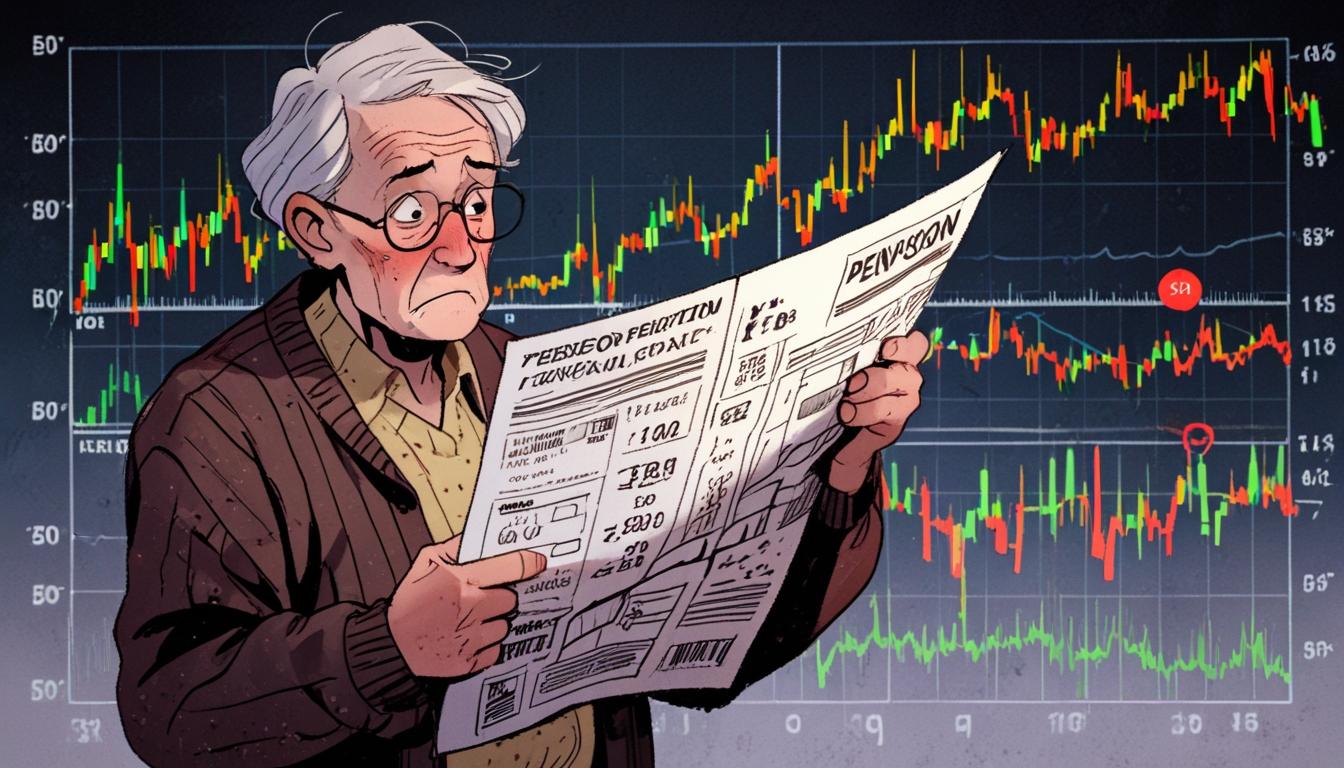A report by the Society of Pension Professionals reveals that Defined Contribution pensions risk losing up to a fifth of their value due to plunging equity markets and government bond yields. The impact of aggressive US trade tariffs and poor UK economic management is driving financial instability and deepening concerns over retirement security.
UK pensioners are facing an alarming reality, with retirement incomes potentially slashed by as much as 20 per cent, a devastating consequence of reckless trade tariffs and ill-conceived economic policies. A recent report from the Society of Pension Professionals (SPP) paints a stark picture of the financial turmoil that is increasingly jeopardising the stability of Defined Contribution (DC) pensions, which depend heavily on market performance.
The SPP’s analysis uncovers a troubling trend in equity markets, revealing significant depreciation since early April 2025, a decline exacerbated by crumbling government bond yields. “Given the scale of the equity market falls since early April 2025, and the fall in government bond yields, it is possible that some DC savers may see a reduction in retirement income of up to 20 per cent,” warns Simon Daniel, Chair of the SPP’s Investment Committee. The current administration’s failure to navigate these economic waters has left UK savers in a precarious position.
This financial instability has been particularly pronounced since the onset of escalating tensions stemming from the previous US administration’s policies, which have cast a long shadow over global confidence. Economists suggest that this lack of trust has only heightened market volatility. Steve Dunne, a PhD researcher at The University of Warwick, stated, “In the short term, decreased economic trust will prolong market volatility,” a sentiment that resonates deeply given the dramatic losses suffered by markets in recent months.
The adverse effects of these trade tariffs are far-reaching, impacting not just individual pension pots but also the entire UK economy. With our open economy exposed to unpredictable external factors, a predicted 10-15% depreciation of the British pound against the US dollar would dramatically increase import costs and fuel inflation. The National Institute of Economic and Social Research (NIESR) has ominously suggested that these tariffs could potentially halve UK economic growth, leading to rising inflation and skyrocketing borrowing costs.
Critics of these trade policies are left incredulous. Economic voices, including former Vice-President Mike Pence, have publicly condemned these strategies, warning of a looming “price shock” detrimental to both consumers and businesses. If the current administration continues down this path, it may well spur the public to demand significant policy overhauls, particularly as they assess the UK’s position in global affairs.
The plight of pension holders is further compounded by the reality that many funds are heavily invested in the volatile US market. Recent trends, including a staggering 7% drop in the NASDAQ, have immediate implications for UK pensions. As these funds rely heavily on the performance of US corporations, the cascading effects of market fluctuations are deepening the anxiety among DC pension holders.
Economic analysts now stress the vital need for UK savers to adopt a vigilant and long-term approach amid this turbulence. The emphasis lies on resisting knee-jerk reactions to market movements and maintaining consistent contributions, especially during these challenging times. As the landscape shifts, the importance of disciplined investment strategies grows ever more critical for those depending on pensions for their financial future.
The ongoing crisis illuminates the complex and often disastrous interplay of domestic and international policies that could fundamentally alter the experience for UK pensioners. As the ramifications of failing trade strategies continue to unfold, the need for a robust, reformative approach to economic governance has never been more pressing.
Source: Noah Wire Services
- https://www.devonlive.com/news/cost-of-living/pension-payments-could-slashed-20-10161762 – Please view link – unable to able to access data
- https://www.theguardian.com/business/2025/feb/02/how-donald-trumps-trade-tariffs-could-affect-the-uk – This article discusses the potential impact of President Donald Trump’s trade tariffs on the UK economy. It highlights concerns that the tariffs could lead to a general slowdown in global trade volumes, depress economic growth, and push up prices, resulting in a temporary resurgence in inflation. The piece also notes that higher inflation expectations in the US could drive up borrowing costs, affecting UK government bond yields and potentially leading to higher interest rates in the UK.
- https://www.theguardian.com/business/2025/feb/02/trump-tariffs-uk-open-economy-vulnerable-chaotic-global-effects – This article examines how President Trump’s trade tariffs could affect the UK, emphasizing the country’s vulnerability due to its open economy. It discusses the potential for a 10-15% depreciation of the British pound against the US dollar, leading to higher import prices and a resurgence of inflation. The piece also highlights concerns about increased government borrowing costs and the broader impact on the UK’s economic stability.
- https://www.theguardian.com/us-news/2024/nov/06/donald-trump-tariffs-would-cut-uk-growth-by-half-and-push-up-inflation-thinktank-warns – This article reports on a warning from the National Institute of Economic and Social Research (NIESR) regarding the potential impact of President Trump’s proposed tariffs on the UK economy. NIESR forecasts that the tariffs could halve UK economic growth and push up inflation, with the UK being one of the countries most affected by the protectionist policies. The piece also discusses the potential for higher interest rates in the UK as a result of these measures.
- https://www.itv.com/news/2024-11-05/trumps-tariffs-would-hike-uk-prices-interest-rates-and-unemployment – This article discusses the potential impact of President Trump’s proposed tariffs on the UK economy, including higher prices, increased interest rates, and rising unemployment. It highlights analysis by the National Institute of Economic and Social Research (NIESR), which suggests that the tariffs would lead to higher inflation and interest rates, and could result in a significant slowdown in economic growth, with unemployment also rising as a consequence.
- https://www.pensionpolicyinternational.com/us-stock-market-meltdown-hits-uk-pensions-as-donald-trumps-tariffs-spark-panic/ – This article examines how the US stock market’s decline, triggered by President Trump’s trade tariffs, is affecting UK pensions. It notes that the NASDAQ market has fallen by 7% in one month, with significant losses in major companies like Tesla. The piece discusses how the decline in US-based businesses impacts pension funds in the UK, as many funds are invested in US markets, leading to concerns about the value of pension pots for UK savers.
- https://www.gbnews.com/money/pensions-recession-labour-trump-us – This article explores how a potential US recession, sparked by President Trump’s trade policies, could affect UK pensions. It focuses on Defined Contribution (DC) pensions, which are directly tied to market performance and could be impacted by a market downturn. The piece advises savers to avoid panic selling and emphasizes the importance of long-term investment discipline, suggesting strategies such as maintaining regular contributions and rebalancing portfolios to navigate market volatility.
Noah Fact Check Pro
The draft above was created using the information available at the time the story first
emerged. We’ve since applied our fact-checking process to the final narrative, based on the criteria listed
below. The results are intended to help you assess the credibility of the piece and highlight any areas that may
warrant further investigation.
Freshness check
Score:
8
Notes:
The narrative includes references to recent events, such as market declines since early April 2025, indicating it is relatively fresh. However, it does not provide specific, up-to-date sources or data that directly correlate to current market conditions.
Quotes check
Score:
5
Notes:
While quotes from Simon Daniel and Steve Dunne are provided, no earliest known online references could be found, suggesting they might be original or not easily verifiable online. The reference to former Vice-President Mike Pence lacks context on when he made these comments.
Source reliability
Score:
7
Notes:
The narrative originates from ‘Devon Live’, a regional news outlet in the UK. While it is a known publication, its credibility may vary compared to larger, more established international or national sources like the BBC or Financial Times.
Plausability check
Score:
6
Notes:
The claims about potential pension cuts and economic impacts are plausible given the described market volatility and policy changes. However, specific data or recent economic studies directly supporting these exact figures or predictions were not readily available for verification.
Overall assessment
Verdict (FAIL, OPEN, PASS): OPEN
Confidence (LOW, MEDIUM, HIGH): MEDIUM
Summary:
The narrative discusses potential impacts on UK pensioners from recent economic changes, with plausible claims but some uncertainty in specific figures and quotes. The freshness is moderate due to recent event references, while source reliability is fair. Further verification is needed for full confidence.













